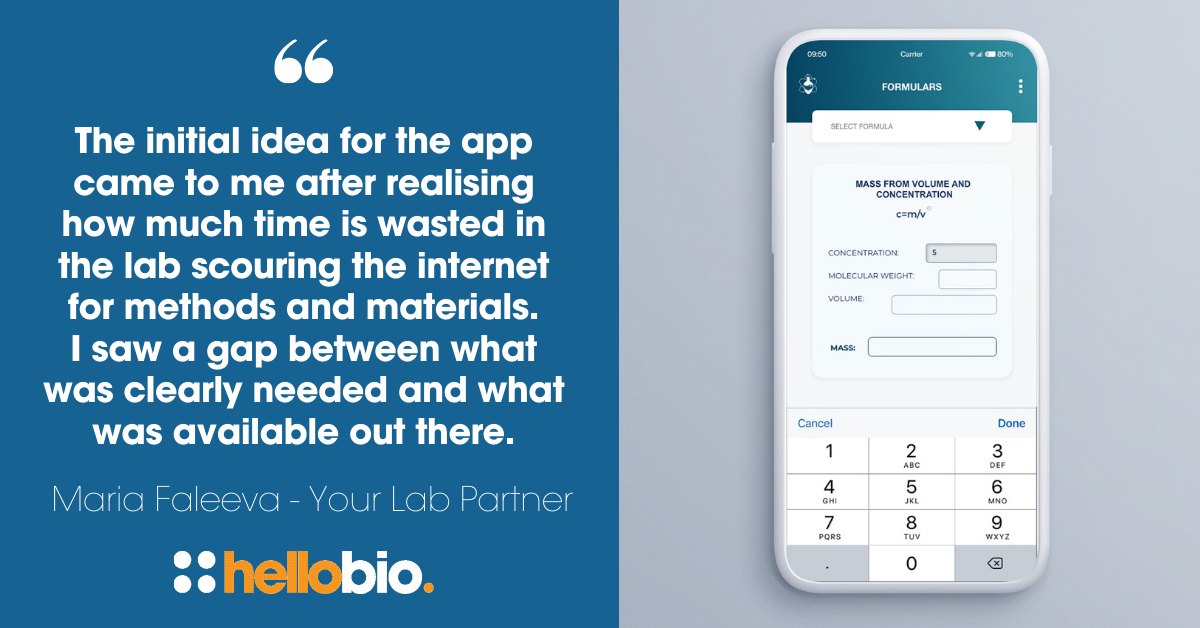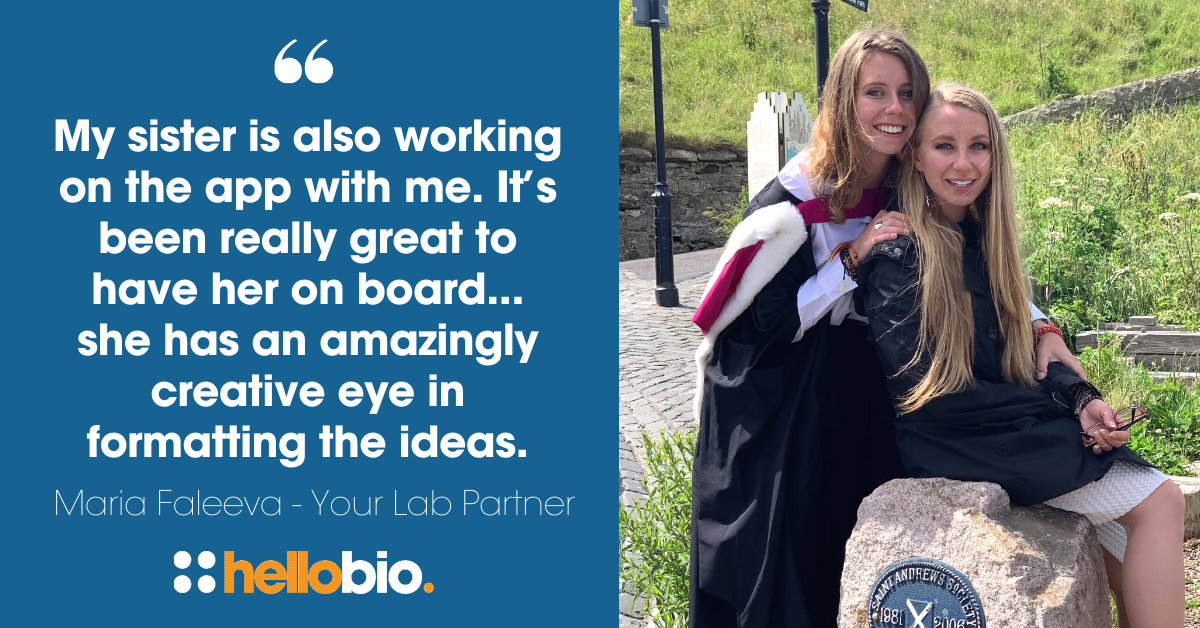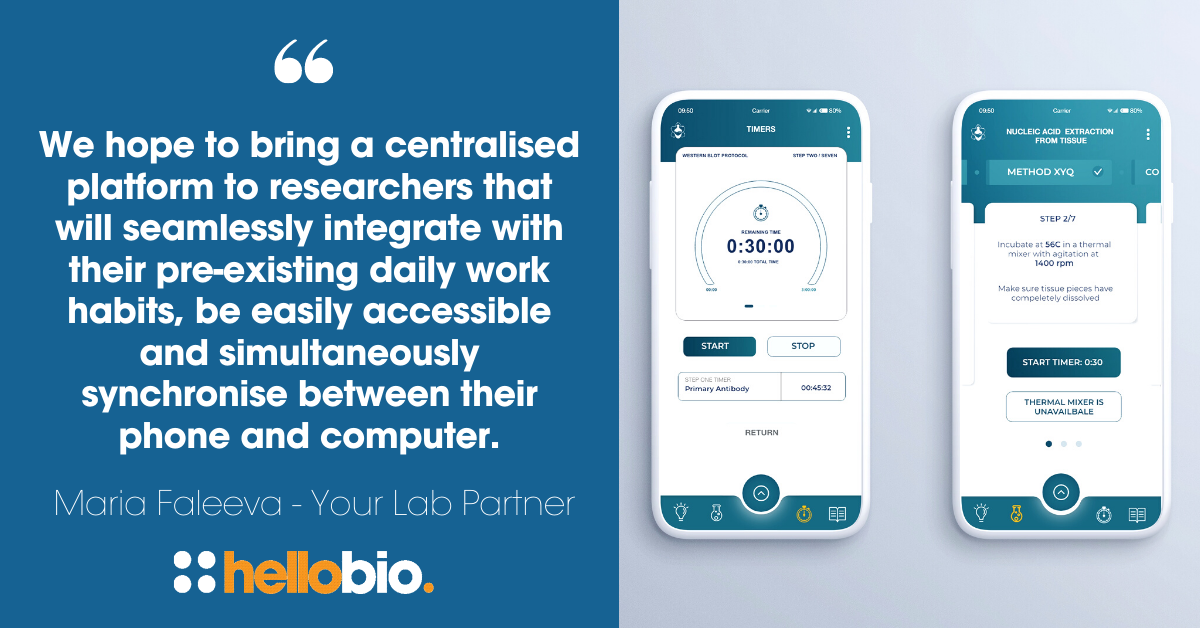Interviews with Scientists: Maria Faleeva
Maria Faleeva is a cardiovascular research PhD student at Kings College London. Her research focuses on the relationship between vascular smooth muscle cells and the extracellular matrix, using new tools such as Atomic Force Microscopy to determine which cellular factors play the biggest role in regulating matrix stiffness.
She studied Biochemistry at the University of St Andrews, before taking on a Masters in Research at Imperial College, exploring cellular pathways in stem cell derived cardiomyocytes. She is also the creator and founder of Your Lab Partner, a new mobile app for researchers in the lab. The app, which is currently still at development stage, will offer users the opportunity to exchange information regarding protocols, review consumables, as well as access handy toolkit functions such as multiple timers, calculators, and pre-existing methods.
We spoke to Maria about her background as a scientist, and how the idea for the app came about. She explains in more detail how she hopes Your Lab Partner will offer solutions to some of the biggest challenges faced by academic lab scientists today.
Thanks for speaking with us, Maria! Firstly, please tell us a bit more about your background as a scientist...
I finished my undergraduate degree in Biochemistry at the University of St Andrews. Despite not always being very confident in research, I knew after my second year that I wanted to continue down the research career route. After finishing university, I took on a Masters in Research at Imperial College, exploring cellular pathways in stem cell derived cardiomyocytes. During this time, I was really excited and passionate about cardiovascular research, and wanted to direct my focus towards understanding the pathology behind cardiovascular diseases. Upon finishing my Masters last October, I took on a BHF funded PhD at Kings College London in Prof. Cathy Shanahan’s lab.
What is the focus of your PhD research?
Broadly speaking, my research looks to deepen our understanding of vascular ageing and stiffening. I am looking at the relationship between vascular smooth muscle cells and the extracellular matrix. To do so, I am using exciting and new tools such as Atomic Force Microscopy to determine which cellular factors play the biggest role in regulating matrix stiffness.
Where did the idea for the ‘Your Lab Partner’ app come from?
The initial idea for the development of Your Lab Partner came to me after realising how much time is wasted in the lab scouring the internet for methods and materials. I saw a gap between what was clearly needed and what was available out there. The more I thought about it, the more the idea grew and developed in my mind. I wanted to create a centralised platform for researchers that they could turn to to address their everyday problems in the lab, whether it be having unlimited stopwatches, or having access to a novel protocol right at your fingertips.

Have you designed or created an app before?
No, this is my first! I have always been really interested by app development, but have never gotten the chance, or had an idea that I was as passionate about as I am about Your Lab Partner, to really pursue it! My sister, Zen, is also working on the app with me. It’s been really great to have her on board with the idea. She has a background in graphic design, so it has been really great to have her help with the process, as she has an amazingly creative eye in formatting the ideas!

Who will the app be aimed at?
The core functions of the app are primarily aimed at postgraduate researchers in academia, such as Masters and PhD students, as well as early stage researchers. However, I believe it has the potential to bring together and benefit the entire research community across the globe.
What functions will the app have?
The app will be divided into three core components. The first grants the user access to previously published methods, covering the essential techniques across many different areas of research, and presented in a user friendly manner. The second aspect of ‘Your Lab Partner’ will provide an IP protected space within which you can upload your own protocols to be accessible to either a select number of people (for example, members of your lab group), or for public use. Finally, the third component will provide the researcher with a handy laboratory toolkit. It will contain essential tools such as multiple and customisable timers, calculators with built-in formulas, and a space for quick note-taking.
What makes the app unique or different to other apps on the market?
The other apps that offer similar services to Your Lab Partner are primarily targeted towards pharmaceutical research, thus making the interface difficult or excessive to navigate for someone in an academic research background. Furthermore, although they offer extensive tools for an online notebook, we understand that it is a difficult and slow process to make a complete switch away from the standard way of paper and pen. We hope to bring a centralised platform to researchers that will seamlessly integrate with their pre-existing daily work habits, be easily accessible and simultaneously synchronise between their phone and computer!

What do you think are the biggest challenges that scientists face in the lab, and how will your app help with these?
I think the two biggest problems faced by researchers in the lab is the reproducibility and reliability of results, as well as struggling with increasing one’s time efficiency in the lab. By providing easy access to pre-existing protocols and open access to personalised protocols, Your Lab Partner will work to increase the transparency between experimental procedures. This in turn will hopefully increase the replicability of results, both internally within a lab, and on a wider scale. Your Lab Partner’s functions will also hopefully increase the efficiency of a researcher within a lab by modernising the daily tools used in the lab, and by providing other key information such as reagent reviews on the platform, thus saving time and money.
When do you hope to launch the app, and where will it be available?
We are currently still in the development stage of the app, trying to find a suitable company to program it for us. If everything goes to plan it should be available in the autumn of 2021.
Do you have plans to create more apps in the future?
Not at the moment, but I have big plans for Your Lab Partner. We are just at the beginning of the journey but already I have so many exciting things planned on how to expand the app and bring knowledge and experience together.
Where can we find out more about the app?
Please check out the website at www.yourlabpartner.co.uk. If you are interested in the project, please sign up to the newsfeed to keep up with the app’s development, and to be notified upon its release!
_________________________________________________
Thank you so much for speaking to us, Maria! We wish you all the best with the app and look forward to seeing it launched.
Connect with Maria Faleeva and Your Lab Partner:
- LinkedIn: Maria Faleeva
- Twitter: @FaleevaMaria
- Website: www.yourlabpartner.co.uk
_________________________________________________
If you enjoyed this article, why not check out the other resources available on our blog. We are passionate about supporting life scientists including early career life scientists and PhD students - with really low-priced reagents and biochemicals, early career scientist grants, and resources to help with both personal and professional development. We know how tough it is - so we hope you find these helpful!
More General Support for Life Scientists
For advice on writing papers, dissertations, presenting at conferences, wellbeing, PhD support, networking and lots more, we have a huge range of articles to help - just click below:
Save up to 50% on our high purity reagents...
When you get to the stage of planning your experiments, don't forget that we offer a range of low-cost, high-purity agonists, antagonists, inhibitors, activators, antibodies and fluorescent tools (yes - they really are around half the price of other suppliers!) You can use our Quick Multi-Search Tool to search for lots of products in one go, and the range includes:
- Enzyme inhibitors and activators
- Chemogenetic ligands
- Ion channel modulators
- GPCR & ionotropic receptor ligands
- Cell biology reagents & biochemicals
Technical resources
Try our Molarity Calculator: a quick and easy way to calculate the mass, volume or concentration required for making a solution.
Try our Dilution Calculator: an easy way to work out how to dilute stock solutions of known concentrations
And finally, don't forget to check back in with our blog regularly for our latest articles. If there’s something you’d love to contribute to the community, whether that’s an interview or article, drop us a line at hello@hellobio.com
---

















